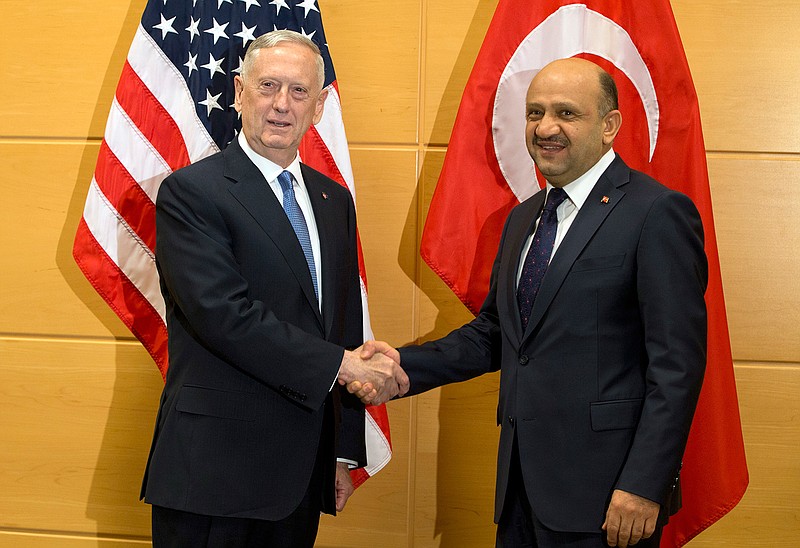BRUSSELS-In an ultimatum to America's allies, Defense Secretary Jim Mattis told fellow NATO members Wednesday to increase military spending by year's end or risk seeing the U.S. curtail its defense support-a stark threat given Europe's deep unease already over U.S.-Russian relations.
Echoing President Donald Trump's demands for NATO countries to assume greater self-defense responsibility, Mattis said Washington will "moderate its commitment" to the alliance if countries fail to fall in line. He didn't offer details, but the pressure is sure to be felt, particularly by governments in Europe's eastern reaches that feel threatened by Russian expansionism.
Trump's Russia policy remains a mystery for many of America's closest international partners. As a candidate, the Republican president steered clear of criticizing Moscow for its 2014 annexation of Ukraine's Crimea region and repeatedly praised Russian President Vladimir Putin, saying he wanted a new era of cooperation between the former Cold War foes.
But that possibility grew murkier this week as Trump fired his national security adviser, Michael Flynn, over the retired Army lieutenant general's communications with Russia before Trump took office. The departure of Flynn, who also promoted the idea of working with Moscow, has added to speculation about how the U.S.-Russian relationship might evolve.
Amid the uncertainty from Washington, the Kremlin may be testing the West's resolve. A U.S. defense official said this week that Russia has deployed a cruise missile in violation of a Cold War-era nuclear arms control treaty. And violence has sporadically re-ignited in eastern Ukraine, where the U.S. and its partners say Moscow continues to back a separatist insurgency.
"No longer can the American taxpayer carry a disproportionate share of the defense of Western values," Mattis told the alliance's 27 other defense ministers, according to a text of his remarks. "Americans cannot care more for your children's future security than you do."
The entire alliance seemed to hang on Mattis' every word Wednesday. Officials crowded around televisions at the NATO meeting in Brussels to watch the retired general's initial appearance with Secretary-General Jens Stoltenberg. Defense ministers clustered around Mattis as he entered the meeting room.
Citing danger from Russia, Mattis told the closed meeting of ministers they must adopt a plan this year that sets dates for governments to meet a military funding goal of 2 percent of gross domestic product. He called the funding increase a "fair demand" based on the "political reality" in Washington, an apparent reference to Trump's past criticism of NATO as "obsolete" and his much-touted "'America First" mantra.
Noting the threat posed by the Islamic State group in Iraq and Syria, Mattis said: "Some in this alliance have looked away in denial of what is happening."
"We have failed to fill gaps in our NATO response force or to adapt," he added.
Trump has challenged the alliance to take on a greater share of military costs, even rattling European nations by suggesting the U.S. might not defend allies unwilling to fulfill their financial obligations as NATO members.
Mattis didn't go that far, and Wednesday's focus appeared to be on simply increasing military funding if not fully reaching the target. Many European governments face hostility to more military spending, especially as their slow economic recoveries force belt-tightening elsewhere.

